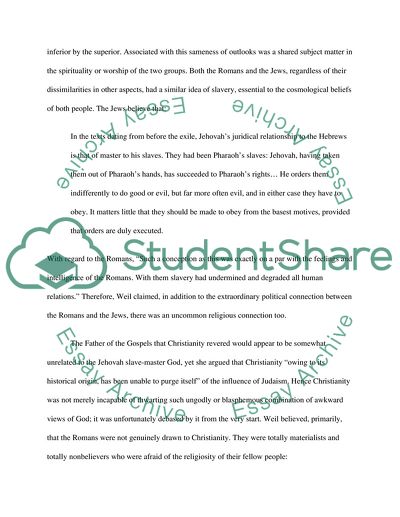Cite this document
(“Simone Weil regards Christianity as a religion for slaves. What does Essay”, n.d.)
Simone Weil regards Christianity as a religion for slaves. What does Essay. Retrieved from https://studentshare.org/religion-and-theology/1654509-simone-weil-regards-christianity-as-a-religion-for-slaves-what-does-she-mean-by-this-and-is-it-a-justified-claim
Simone Weil regards Christianity as a religion for slaves. What does Essay. Retrieved from https://studentshare.org/religion-and-theology/1654509-simone-weil-regards-christianity-as-a-religion-for-slaves-what-does-she-mean-by-this-and-is-it-a-justified-claim
(Simone Weil Regards Christianity As a Religion for Slaves. What Does Essay)
Simone Weil Regards Christianity As a Religion for Slaves. What Does Essay. https://studentshare.org/religion-and-theology/1654509-simone-weil-regards-christianity-as-a-religion-for-slaves-what-does-she-mean-by-this-and-is-it-a-justified-claim.
Simone Weil Regards Christianity As a Religion for Slaves. What Does Essay. https://studentshare.org/religion-and-theology/1654509-simone-weil-regards-christianity-as-a-religion-for-slaves-what-does-she-mean-by-this-and-is-it-a-justified-claim.
“Simone Weil Regards Christianity As a Religion for Slaves. What Does Essay”, n.d. https://studentshare.org/religion-and-theology/1654509-simone-weil-regards-christianity-as-a-religion-for-slaves-what-does-she-mean-by-this-and-is-it-a-justified-claim.


